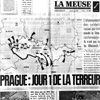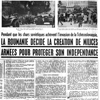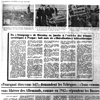National Content: Belgium
Prague, first day of terror
| Source | « La Meuse », n°196, the 22th of August 1968, P. 1, 6, 7. |
| Event referred to | 20th of August 1968 : USSR invasion of Czech Republic |
| Technological characteristics | Type of file: Image Extension : pdf Characteristics Dimension of the file: < 2000 Ko Availability proposed: pdf document with zoom options |
| Description of the source | Kind of source: Newspaper article Origin of the source: Archives of the University of Liège (Belgium) Language: French Copyright issues: reproduction and pedagogical exploitation authorized in the framework of the MHM project |
| Contextualisation of the source | « La Meuse » is a French-speaking popular newspaper. Started in 1855, this daily of neutral trend was edited in Liege and has six regional editions. It is an opened place for the local information. This newspaper uses typographic and lay out processes based on headnotes and numerous pictures. It is read by all classes. In 1967, 180.000 copies of this newspaper were published. (J. GOL, Le monde de la presse en Belgique, édition du Centre de Recherche et d’Information socio-politiques – CRISP- 1970) |
| Interpretation of the source | The presentation of the first page aims to sensitize the reader. The title sounds like a movie title, giving the reader the feeling to be immersed into action. The tone used by the journalist shows his disagreement with the events. The event takes 2/3 of the first page, showing that way the importance the diary gives to that event. There is a large map showing the progression of the Soviet troops as well as 3 pictures : two of them showing the Russian tanks advancing in Czechoslovakia and the third one showing the emaciated face of a man. We learn who he is by reading the article situated between the different pictures. It is a man who has been killed by the Russians because he tried to resist to them. The tone of the article clearly tries to make the reader react. We find one more paragraph promising the reader a detailed relation of the Czechoslovakian events made hour after hour by a special correspondent. So, the diary tries to stir the reader’s heart, to give him a detailed relation of the facts, but a few analysis. The diary wants to show what happens in Czechoslovakia. |
| Original Contents | EXTRAIT : « Pendant un temps, on se souviendra que, quelles que soient ses variations, le communisme ne survit que par ses bourreaux : Staline, Khrouchtchev le furent quand il le fallait, Brejnev l’est quand il le faut, et son successeur le sera quand il le faudra. Mao Tsé Toung écrivait dans « Problèmes de la guerre et de stratégie » : « La tâche centrale et la forme suprême de révolution c’est la conquête du pouvoir par la force armée, c’est résoudre le problème par la guerre. Ce principe révolutionnaire du marxisme-léninisme est valable partout ». Les faits sont là et les commentaires vains. La tragédie n’est pas accidentelle, elle est permanente : depuis 51 ans à Moscou, depuis 23 ans ailleurs. Il arrive que le monde libre la voie : encore faut-il qu’elle soit aveuglante, comme aujourd’hui à Prague. L’empire un jour s’effondrera mais la décolonisation des Européens civilisés de l’Est n’est pas encore proche. Et les Tchèques sont actuellement le symbole de ceux qui sont seuls parce que le partage du monde s’est fait à Yalta. Limiter son émotion à « la coexistence pacifique qui pourrait être retardée », c’est respecter uniquement une faute tactique. Autrement dit : c’est admettre le crime pourvu qu’il reste en permanence discret. » |
| Original Contents (English Translation) |


